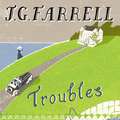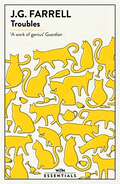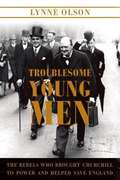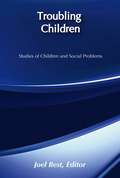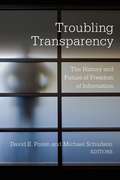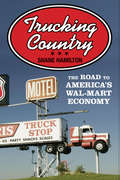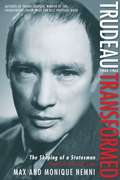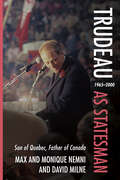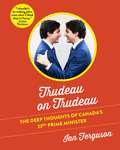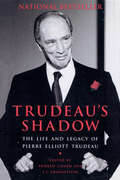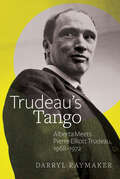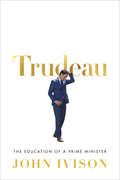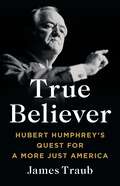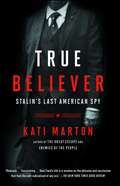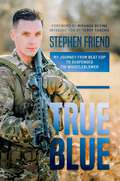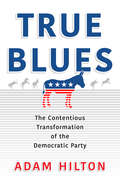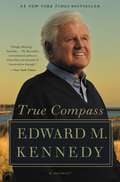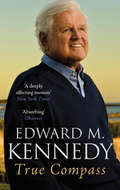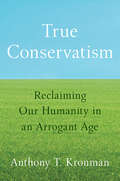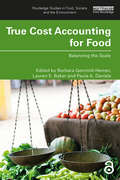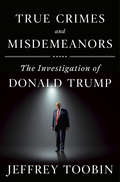- Table View
- List View
Troubles: Winner of the Lost Man Booker Prize 1970 (W&N Essentials)
by J. G. FarrellWinner of the 1970 lost Man Booker prize in 2010.Major Brendan Archer travels to Ireland - to the Majestic Hotel and to the fiancée he acquired on a rash afternoon's leave three years ago. Despite her many letters, the lady herself proves elusive, and the Major's engagement is short-lived. But he is unable to detach himself from the alluring discomforts of the crumbling hotel. Ensconced in the dim and shabby splendour of the Palm Court, surrounded by gently decaying old ladies and proliferating cats, the Major passes the summer. So hypnotic are the faded charms of the Majestic, the Major is almost unaware of the gathering storm. But this is Ireland in 1919 - and the struggle for independence is about to explode with brutal force.(p) Orion Publishing Group 2018
Troubles: Winner of the Lost Man Booker Prize 1970 (W&N Essentials)
by J.G. FarrellWINNER OF THE 1970 BOOKER PRIZE'And so at the Majestic everything returned to the way it had been before. The gleaming tiles became dulled. Sofas as sleek as prize cattle lost their glow.' 1919, the Majestic Hotel in Kinalough, Ireland. Haunted war veteran Major Brendan Archer arrives to marry Angela Spencer, daughter of the house. But his fiancée is strangely altered, and her family's fortunes have suffered a spectacular decline. The hotel's hundreds of rooms are disintegrating; its few remaining guests thrive on rumours and games of whist; herds of cats have taken over the Imperial Bar; bamboo shoots threaten the foundations; and piglets frolic in the squash court. And outside the order of the British Empire totters, as the violence of 'the troubles' mounts. 'A work of genius' Guardian
Troubles: Winner of the Lost Man Booker Prize 1970 (W&N Essentials)
by J.G. FarrellWINNER OF THE 1970 BOOKER PRIZE'And so at the Majestic everything returned to the way it had been before. The gleaming tiles became dulled. Sofas as sleek as prize cattle lost their glow.' 1919, the Majestic Hotel in Kinalough, Ireland. Haunted war veteran Major Brendan Archer arrives to marry Angela Spencer, daughter of the house. But his fiancée is strangely altered, and her family's fortunes have suffered a spectacular decline. The hotel's hundreds of rooms are disintegrating; its few remaining guests thrive on rumours and games of whist; herds of cats have taken over the Imperial Bar; bamboo shoots threaten the foundations; and piglets frolic in the squash court. And outside the order of the British Empire totters, as the violence of 'the troubles' mounts. 'A work of genius' Guardian
Troublesome Young Men: The Rebels Who Brought Churchill to Power and Helped Save England
by Lynne OlsonA riveting history of the daring politicians who challenged the disastrous policies of the British government on the eve of World War II. On May 7, 1940, the House of Commons began perhaps the most crucial debate in British parliamentary history. On its outcome hung the future of Prime Minister Neville Chamberlain's government and also of Britain indeed, perhaps, the world. Troublesome Young Men is Lynne Olson's fascinating account of how a small group of rebellious Tory MPs defied the Chamberlain government's defeatist policies that aimed to appease Europe's tyrants and eventually forced the prime minister's resignation. Some historians dismiss the "phony war" that preceded this turning point --from September 1939, when Britain and France declared war on Germany, to May 1940, when Winston Churchill became prime minister--as a time of waiting and inaction, but Olson makes no such mistake, and describes in dramatic detail the public unrest that spread through Britain then, as people realized how poorly prepared the nation was to confront Hitler, how their basic civil liberties were being jeopardized, and also that there were intrepid politicians willing to risk political suicide to spearhead the opposition to Chamberlain --Harold Macmillan, Robert Boothby, Leo Amery, Ronald Cartland, and Lord Robert Cranborne among them. The political and personal dramas that played out in Parliament and in the nation as Britain faced the threat of fascism virtually on its own are extraordinary --and, in Olson's hands, downright inspiring.
Troubling Children: Studies of Children and Social Problems (Social Problems And Social Issues Ser.)
by Joel BestIncreasingly, sociologists have turned their attention to the social problems of children– in particular, of younger children. This collection reflects those recent interest. While most researchers have focused on social problems involving adolescents, this volume offers instead original case studies of problems concerning preadolescent children.The papers that Best has gathered here represent different theoretical and methodological approaches. They report on social issues in Albania, Kenya, and Japan as well as in the United States. The range of social problems they address is a wide one, from broad societal crises to decision-making within families. Topics include the effects of economic and social crises in Africa and Eastern Europe; concerns about crack use and other forms of fetal endangerment; parental decisions about spanking, toy choices, and letting children listen to rock music; schooling in day care and elementary and junior high schools; and children's perceptions of environmental crises.Troubling Children adds a new dimension to courses in social problems. It also offers a different set of perspectives for those concerned with sociology of preadolescent children and their discontents.
Troubling Transparency: The History and Future of Freedom of Information
by Michael Schudson David E. PozenToday, transparency is a widely heralded value, and the U.S. Freedom of Information Act (FOIA) is often held up as one of the transparency movement’s canonical achievements. Yet while many view the law as a powerful tool for journalists, activists, and ordinary citizens to pursue the public good, FOIA is beset by massive backlogs, and corporations and the powerful have become adept at using it for their own interests. Close observers of laws like FOIA have begun to question whether these laws interfere with good governance, display a deleterious anti-public-sector bias, or are otherwise inadequate for the twenty-first century’s challenges.Troubling Transparency brings together leading scholars from different disciplines to analyze freedom of information policies in the United States and abroad—how they are working, how they are failing, and how they might be improved. Contributors investigate the creation of FOIA; its day-to-day uses and limitations for the news media and for corporate and citizen requesters; its impact on government agencies; its global influence; recent alternatives to the FOIA model raised by the emergence of “open data” and other approaches to transparency; and the theoretical underpinnings of FOIA and the right to know. In addition to examining the mixed legacy and effectiveness of FOIA, contributors debate how best to move forward to improve access to information and government functioning. Neither romanticizing FOIA nor downplaying its real and symbolic achievements, Troubling Transparency is a timely and comprehensive consideration of laws such as FOIA and the larger project of open government, with wide-ranging lessons for journalism, law, government, and civil society.
Trucking Country
by Shane HamiltonTrucking Country is a social history of long-haul trucking that explores the contentious politics of free-market capitalism in post-World War II America. Shane Hamilton paints an eye-opening portrait of the rural highways of the American heartland, and in doing so explains why working-class populist voters are drawn to conservative politicians who seemingly don't represent their financial interests. Hamilton challenges the popular notion of "red state" conservatism as a devil's bargain between culturally conservative rural workers and economically conservative demagogues in the Republican Party. The roots of rural conservatism, Hamilton demonstrates, took hold long before the culture wars and free-market fanaticism of the 1990s. As Hamilton shows, truckers helped build an economic order that brought low-priced consumer goods to a greater number of Americans. They piloted the big rigs that linked America's factory farms and agribusiness food processors to suburban supermarkets across the country.Trucking Country is the gripping account of truckers whose support of post-New Deal free enterprise was so virulent that it sparked violent highway blockades in the 1970s. It's the story of "bandit" drivers who inspired country songwriters and Hollywood filmmakers to celebrate the "last American cowboy," and of ordinary blue-collar workers who helped make possible the deregulatory policies of Jimmy Carter and Ronald Reagan and set the stage for Wal-Mart to become America's most powerful corporation in today's low-price, low-wage economy.
Trudeau Transformed: The Shaping of a Statesman 1944-1965
by Monique Nemni Max NemniThis groundbreaking biography continues the story begun in Young Trudeau, taking Canada's legendary Prime Minister from his pro-fascist youth all the way to his entry into federal politics as a crusading Liberal democrat.When he went to Harvard in 1944, Pierre Trudeau was twenty-five, a recent graduate of the University of Montreal Law School; true to his elite Catholic-French education, he had been till recently pro-fascist, and he disliked democracy. Years of graduate study at Harvard, then the Sorbonne, then the London School of Economics exposed him to new ideas, as did his hitchhiking travels around the world. Returned to Quebec as a new man, he engaged in educating workers and other jobs that made him a famous defender of federal democracy. He entered Parliament in 1965, within three years of rocketing, Obama-like, to the very top.From the Hardcover edition.
Trudeau as Statesman: 1965–2000, Son of Quebec, Father of Canada
by Monique Nemni Max Nemni David MilnePierre Elliott Trudeau takes on the Quebec Question with a bang, not a whimper. In Max and Monique Nemni’s third and final volume of their Pierre Elliott Trudeau biography, the man who would be statesman is granted his life’s wish. In his fifteen years as prime minister of Canada, Trudeau oversaw the controversial White Paper of 1969 on Indigenous policy, the fateful October Crisis of 1970, and the repatriation of the Canadian Constitution together with a Charter of Rights and Freedoms. In retirement, he exercised immense influence over Canada’s later constitutional politics and was principally responsible for defeating both the Meech Lake and Charlottetown Accords during the government of Brian Mulroney. Loved and hated in almost equal measure, Trudeau was an iconoclast, shaking up Canada’s two solitudes as no other prime minister has ever dared to do. In this meticulously researched and argued political biography, Pierre Trudeau is seen wrestling with the most difficult — and momentous — decisions of his career.
Trudeau on Trudeau: The Deep Thoughts of Canada's 23rd Prime Minister
by Ian FergusonA satirical journey through the mind of the part-time snowboarding instructor and drama teacher who is the prime minister of Canada.Trudeau on Trudeau is a book like no other. It’s a collection of real words spoken by Prime Minister Justin Trudeau that paints a portrait of a man who hasn’t quite gotten the hang of leading Canada. Included are familiar quotes, such as “The budget will balance itself”; the infamous “You are a piece of sh*t”; and the plain pathetic “We will grow the economy from the heart out”; and many, many more. Full of real photos of Justin taking selfies, quizzes, a photo album of Justin’s taxpayer-funded vacation in India, and laugh-out-loud commentary, Trudeau on Trudeau is sure to answer the question, “What happens when a part-time snowboarder and drama teacher becomes prime minister of Canada?” Trudeau on Trudeau is a must-have, not just for political junkies, but for any and all Canadians who care about the future of our country.
Trudeau's Shadow: The Life and Legacy of Pierre Elliott Trudeau
by J. L. GranatsteinThe Life and Legacy of Pierre Eilliott Trudeau
Trudeau's Tango: Alberta Meets Pierre Elliott Trudeau, 1968–1972
by Darryl RaymakerA chronicle of Pierre Elliot Trudeau’s first term as prime minister and the attempt to bridge one of Canada’s classic political fault lines.Trudeau appeared to enjoy the encounter. He stood his ground while escaping projectiles, including a tomato . . .In this insightful and lively history, Liberal insider Darryl Raymaker recalls the attempt to broker “a marriage from hell” between the federal Liberal Party and Alberta’s Social Credit government in the late 1960s. Raymaker uses his deep connections and backroom knowledge to trace the tangled political relationships that developed when charismatic statesman Pierre Trudeau confronted the forces of oil and agriculture in Canada’s west. Part memoir, part chronicle, Trudeau’s Tango provides a window into Canadian history, politics, economics and the zeitgeist of the late 1960s.“Trudeau’s Tango is part memoir, part documentary of the geographic, cultural and political divisions that are a permanent fixture of Confederation. The fact we held it together remains a world-class achievement. . . . Compelling reading for any Canada 150 book club . . . A fresh and lively account of politics with sharp elbows.” —Holly Doan, Blacklock’s Reporter“An excellent book about Alberta and the Trudeaus.” —Warren Kinsella, HuffPost“[Raymaker’s] book recalls a tumultuous political era with wry humour and a touch of anger.” —Frank Dabbs, Alberta Views“A detailed chronology of the history and tangled political relationships of the Liberal Party at the national and provincial levels and its opponents in Alberta—the once dominant Social Credit Party and then the Progressive Conservatives—from December 1967 through November 1972. The account is filled with blow-by-blow descriptions of political events and encounters at the provincial level. . . . Recommended.” —G.A. McBeath, CHOICEMagazine
Trudeau: The Education of a Prime Minister
by John IvisonFrom one of Canada's most popular and connected political journalists, an unblinkered warts-and-all look at Justin Trudeau and the Liberal government's record in power. A must-read as we head into the 2019 federal election.Canadians are becoming increasingly skeptical about their chameleon prime minister. When he entered politics, Justin Trudeau came across as a person with no fixed principles. Now, he presents himself as a conviction politician. What motivated his metamorphosis—belief or opportunism? Either way, in 2019’s election he will be judged on results—results that have so far been disappointing for many, even those in his own party. From the ballooning deficit to the Trans Mountain purchase to the fallout of his disastrous trip to India to the unpopular implementation of a carbon tax, Justin Trudeau has presided over his share of controversy. Most damaging, his egregious missteps during the SNC-Lavalin scandal and the subsequent resignation of two top ministers, his principal secretary, and the clerk of the Privy Council have raised serious questions about Trudeau’s integrity. As a political columnist for the National Post since 2003and Ottawa bureau chief for Postmedia for the past three years, John Ivison has watched Trudeau evolve as a politician and leader, a fascinating transition that has not been fully captured by any writer. Trudeau traces the complexities of the man himself, now barely visible beneath the talking points, virtue signalling, and polished trappings of office. Ivison concludes that while Trudeau led a moribund Liberal Party to victory in the 2015 election, the shine of his leadership has been worn off by a series of self-inflicted wounds, broken promises, and rookie mistakes. One of the central contentions of Trudeau is already apparent: the prime minister’s greatest strengths are also his greatest weaknesses; the famous name, high-handedness, and impulsiveness are as liable to hurl him from office as they were to get him there in the first place. With unprecedented access and insight, John Ivison takes us inside one of the most contentious first terms of any prime minister in our history.
True American: Language, Identity, and the Education of Immigrant Children
by Rosemary C. SalomoneHow can schools meet the needs of an increasingly diverse population of newcomers? Do bilingual programs help children transition into American life, or do they keep them in a linguistic ghetto? Are immigrants who maintain their native language uninterested in being American, or are they committed to changing what it means to be American? In this ambitious book, Rosemary Salomone uses the heated debate over how best to educate immigrant children as a way to explore what national identity means in an age of globalization, transnationalism, and dual citizenship. She demolishes popular myths—that bilingualism impedes academic success, that English is under threat in contemporary America, that immigrants are reluctant to learn English, or that the ancestors of today’s assimilated Americans had all to gain and nothing to lose in abandoning their family language. She lucidly reveals the little-known legislative history of bilingual education, its dizzying range of meanings in different schools, districts, and states, and the difficulty in proving or disproving whether it works—or defining it as a legal right. In eye-opening comparisons, Salomone suggests that the simultaneous spread of English and the push toward multilingualism in western Europe offer economic and political advantages from which the U.S. could learn. She argues eloquently that multilingualism can and should be part of a meaningful education and responsible national citizenship in a globalized world.
True Believer: A Thriller (Terminal List #2)
by Jack CarrINSTANT BESTSELLER &“Take my word for it, James Reece is one rowdy motherf***er. Get ready!&” —Chris Pratt, star of the #1 Amazon Prime series The Terminal List &“Jack Carr and his alter-ego protagonist, James Reece, continue to blow me away.&” —Mark Greaney, #1 New York Times bestselling author of Mission Critical In #1 New York Times bestselling author Jack Carr&’s follow-up to The Terminal List, former Navy SEAL James Reece&’s skill, cunning, and heroism put the US government back in his debt and set him on another path of revenge. When a string of horrific terrorist attacks plagues the Western world during the holiday season, the broader markets fall into a tailspin. The attacks are being coordinated by a shadowy former Iraqi commando who has disappeared into Europe&’s underground. The United States government has an asset who can turn the Iraqi against his masters: James Reece, the most-wanted domestic terrorist alive. After avenging the deaths of his family and team members, Reece emerges deep in the wilds of Mozambique, protected by the family of his estranged best friend and former SEAL Team member. When a series of events uncovers his whereabouts, the CIA recruits him, using a Presidential pardon for Reece and immunity for the friends who helped him in his mission of vengeance. Now a reluctant tool of the United States government, Reece travels the globe, targeting terrorist leaders, unraveling a geopolitical conspiracy that exposes a traitorous CIA officer, and uncovering a sinister assassination plot with worldwide repercussions. A high-intensity roller-coaster race against time, True Believer is &“one of this year&’s hottest thrillers, and a perfect fit for fans of Vince Flynn, Brad Thor, and Daniel Silva&” (The Real Book Spy).
True Believer: Hubert Humphrey's Quest for a More Just America
by James TraubA celebrated historian recounts Hubert Humphrey&’s role as a liberal hero of twentieth-century America Hubert Humphrey was liberalism&’s most dedicated defender, and its most public and tragic sacrifice. As a young politician in 1948, he defied segregationists and forced the Democratic Party to commit itself to civil rights. As a senator in 1964, he made good on that commitment by helping pass the Civil Rights Act. But as Lyndon B. Johnson&’s vice president, his support for the war in Vietnam made him a target for both Right and Left, and he suffered a shattering loss in the presidential election of 1968. Though Humphrey&’s defeat was widely seen as the end of America&’s era of liberal optimism, he never gave up. Even after his humiliation on the most public stage, he crafted a new vision of economic justice to counter the yawning political divisions consuming American politics. This biography reveals a deep-dyed idealist willing to compromise and even fight ugly in pursuit of a better society. Elegantly crafted and strikingly relevant to the present, True Believer celebrates Hubert Humphrey&’s long struggle for justice for all.
True Believer: Stalin's Last American Spy
by Kati MartonThis astonishing real-life spy thriller, filled with danger, misplaced loyalties, betrayal, treachery, and pure evil, with a plot twist worthy of John le Carré, is relevant today as a tale of fanaticism and the lengths it takes us to.True Believer reveals the life of Noel Field, an American who betrayed his country and crushed his family. Field, once a well-meaning and privileged American, spied for Stalin during the 1930s and '40s. Then, a pawn in Stalin's sinister master strategy, Field was kidnapped and tortured by the KGB and forced to testify against his own Communist comrades. How does an Ivy League-educated, US State Department employee, deeply rooted in American culture and history, become a hardcore Stalinist? The 1930s, when Noel Field joined the secret underground of the International Communist Movement, were a time of national collapse: ten million Americans unemployed, rampant racism, retreat from the world just as fascism was gaining ground, and Washington--pre FDR--parched of fresh ideas. Communism promised the righting of social and political wrongs and many in Field's generation were seduced by its siren song. Few, however, went as far as Noel Field in betraying their own country. With a reporter's eye for detail, and a historian's grasp of the cataclysmic events of the twentieth century, Kati Marton captures Field's riveting quest for a life of meaning that went horribly wrong. True Believer is supported by unprecedented access to Field family correspondence, Soviet Secret Police records, and reporting on key players from Alger Hiss, CIA Director Allen Dulles, and World War II spy master, "Wild Bill" Donovan--to the most sinister of all: Josef Stalin. A story of another time, this is a tale relevant for all times.
True Believer: The Terminal List, True Believer, And Savage Son (Terminal List #2)
by Jack Carr**SOON TO BE A TV SERIES STARRING CHRIS PRATT** 'This is seriously good… the suspense is unrelenting, and the tradecraft is so authentic the government will probably ban it – so read it while you can!' Lee ChildA high-intensity roller-coaster ride, True Believer explodes with action and authenticity that cements Jack Carr as the new leader in political thrillers. Following his brutal quest for revenge, former Navy SEAL James Reece has fled the United States, emerging deep in the wilds of Mozambique. But he can&’t stay hidden for long – when a string of horrific terrorist attacks plagues the Western world, the CIA tracks him down and recruits him. Now a reluctant tool of the United States government, Reece must travel the globe, targeting terrorist leaders and unravelling a geopolitical conspiracy that will have worldwide repercussions . . .If you loved Lee Child's Jack Reacher, Vince Flynn's Mitch Rapp or Mark Dawson's John Milton, you will love True Believer and the James Reece series!Praise for Jack Carr and the James Reece series: 'With a particular line in authentic tradecraft, this fabulously unrelenting thrill-ride was a struggle to put down' Mark Dawson 'Gritty, raw and brilliant!' Tom Marcus &‘So powerful, so pulse-pounding, so well-written—rarely do you read a debut novel this damn good&’ Brad Thor 'With technical ferocity and devastating action sequences, Carr writes both from the gut and a seemingly infinite reservoir of knowledge in the methods of human combat. Loved it!' Chris Hauty &‘The best debut thriller of 2018&’ Washington Times 'Thrilling' Publishers Weekly 'A powerful, thoughtful, realistic, at times terrifying thriller that I could not put down. A terrific addition to the genre, Jack Carr and his alter-ego protagonist, James Reece, continue to blow me away' Mark Greaney 'One of this year&’s hottest thrillers, and a perfect fit for fans of Vince Flynn, Brad Thor, and Daniel Silva' The Real Book Spy
True Blue: My Journey from Beat Cop to Suspended FBI Whistleblower
by Stephen FriendA suspended special agent explains his decision to turn whistleblower and expose FBI politicization and abuse against conservative America.Stephen Friend had his dream job as an FBI special agent. After nearly a decade of combating violent crime, human trafficking, and child predators, he was reassigned to the FBI&’s unprecedented investigation of the political unrest at the United States Capitol on January 6, 2021. Friend soon uncovered efforts by the FBI and Department of Justice to manipulate statistics and exaggerate the nationwide threat of domestic terrorism. Friend spotlighted how the politicized FBI was cooking the books to support an ongoing narrative from the Joe Biden administration to label Donald Trump voters as violent extremists. Friend witnessed overzealous practices to harass conservative Americans and realized the FBI was turning its investigative processes into a punishment. When the married father of two made his bombshell allegations in a whistleblower disclosure, leaders within the FBI exposed themselves as partisan, ambitious players who insisted that January 6th protestors killed police officers and attempted to seize American democracy. Hell-bent on suppressing Friend from exposing the truth, FBI officials seized his gun and badge and suspended him from working as a special agent. In this memoir, Friend reflects on the lessons and life experiences that led him to ultimately risk his career to uphold his FBI special agent oath to protect and defend the United States Constitution against all enemies—both foreign and domestic.
True Blues: The Contentious Transformation of the Democratic Party (American Governance: Politics, Policy, and Public Law)
by Adam HiltonWho governs political parties? Recent insurgent campaigns, such as those of Donald Trump and Bernie Sanders, have thrust this critical question to the center of political debate for casual observers and scholars alike. Yet the dynamics of modern party politics remain poorly understood. Assertions of either elite control or interest group dominance both fail to explain the Trump victory and the surprise of the Sanders insurgency and their subsequent reverberations through the American political landscape.In True Blues, Adam Hilton tackles the question of who governs parties by examining the transformation of the Democratic Party since the late 1960s. Reconceiving parties as "contentious institutions," Hilton argues that Democratic Party change was driven by recurrent conflicts between groups and officeholders to define and control party identity, program, and policy. The outcome of this prolonged struggle was a wholly new kind of party—an advocacy party—which institutionalized greater party dependence on outside groups for legitimacy and organizational support, while also, in turn, fostering greater group dependency on the presidency for the satisfaction of its symbolic and substantive demands. Consequently, while the long conflict between party reformers and counter-reformers successfully opened the Democratic Party to new voices and identities, it also facilitated the growth of presidential power, rising inequality, and deepening partisan polarization.Tracing the rise of the advocacy party from the fall of the New Deal order through the presidency of Barack Obama, True Blues explains how and why the Democratic Party has come to its current crossroads and suggests a bold new perspective for comprehending the dynamics driving American party politics more broadly.
True Compass: A Memoir
by Edward M. KennedyEdward M. Kennedy is widely regarded as one of the great Senators in the nation's history. He is also the patriarch of America's most heralded family. In this landmark autobiography, five years in the making, Senator Kennedy speaks with unprecedented candor about his extraordinary life. The youngest of nine children born to Joseph P. Kennedy and Rose Fitzgerald Kennedy, he came of age among siblings from whom much was expected. As a young man, he played a key role in the presidential campaign of his brother, John F. Kennedy. In 1962, he was elected to the U.S. Senate, where he learned how to become an effective legislator. His life has been marked by tragedy and perseverance, a love for family and an abiding faith. He writes movingly of his brothers and their influence on him; his years of struggle in the wake of their deaths; his marriage to the woman who changed his life, Victoria Reggie Kennedy; his role in the major events of our time (from the civil rights movement to the election of Barack Obama); and how his diagnosis of a malignant brain tumor has given even greater urgency to his long crusade for improved health care for all Americans. Written with warmth, wit, and grace,True Compass is Edward M. Kennedy's inspiring legacy to readers and to history.
True Compass: A Memoir
by Senator Edward M. KennedyA landmark autobiography and the definite account from a member of America's most heralded family.As a young man, Edward M Kennedy played a key role in the presidential campaign of his brother, John F. Kennedy. In 1962, he was elected to the U.S. Senate, where he learned how to become an effective legislator. His life was marked by tragedy and perseverance; he writes movingly of his brothers and his years of struggle in the wake of their deaths; his marriage to Victoria, the woman who changed his life and his role in the major events of our time from civil rights, Vietnam and Watergate to the quest for peace in Northern Ireland.
True Conservatism: Reclaiming Our Humanity in an Arrogant Age
by Anthony T. KronmanDrawing on the riches of the Western tradition, Anthony T. Kronman defends a humane conservativism for our enlightened age As the party of the left has grown more strident, its conservative critics have responded in kind. Each year conservatives do a poorer job of defending their position as a citadel of human values without lapsing into an angry assault on ideals that they and progressives share. It becomes harder to see the enduring appeal of a true conservatism that celebrates the worth of custom and inheritance; the splendor of what is excellent and rare; the expansive solidarity of our friendship with the dead; and the dignity, indeed necessity, of our longing for a connection to the eternal and divine—while affirming that these timeless human goods are compatible with the modern ideals of equality, toleration, and reasoned argument. In this bracing book, Anthony Kronman defends a conservative philosophy of life that respects our enlightened ideals but decries the damage their arrogant simplification causes in our moral, political, and spiritual lives. Drawing on the work of Aristotle, Cicero, Spinoza, Burke, Hume, Madison, Tocqueville, Lincoln, Arendt, Heidegger, and others, he argues that humanism is conservatism, today as in the past. He reminds us that our humbling parameters make possible every form of human greatness, every human glory, every human love worthy of the name.
True Cost Accounting for Food: Balancing the Scale (Routledge Studies in Food, Society and the Environment)
by Barbara Gemmill-HerrenThis book explains how True Cost Accounting is an effective tool we can use to address the pervasive imbalance in our food system. Calls are coming from all quarters that the food system is broken and needs a radical transformation. A system that feeds many yet continues to create both extreme hunger and diet-related diseases, and one which has significant environmental impacts, is not serving the world adequately. This volume argues that True Cost Accounting in our food system can create a framework for a systemic shift. What sounds on the surface like a practice relegated to accountants is ultimately a call for a new lens on the valuation of food and a new relationship with the food we eat, starting with the reform of a system out of balance. From the true cost of corn, rice and water, to incentives for soil health, the chapters economically compare conventional and regenerative, more equitable farming practices in and food system structures, including taking an unflinching look at the true cost of cheap labour. Overall, this volume points towards the potential for our food system to be more human-centred than profit-centred and one that has a more respectful relationship to the planet. It sets forth a path forward based on True Cost Accounting for food. This path seeks to fix our current food metrics, in policy and in practice, by applying a holistic lens that evaluates the actual costs and benefits of different food systems, and the impacts and dependencies between natural systems, human systems, agriculture and food systems. This volume is essential reading for professionals and policymakers involved in developing and reforming the food system, as well as students and scholars working on food policy, food systems and sustainability.
True Crimes and Misdemeanors: The Investigation of Donald Trump
by Jeffrey ToobinFrom CNN chief legal analyst and bestselling author Jeffrey Toobin, a real-life legal thriller about the prosecutors and congressional investigators pursuing the truth about Donald Trump's complicity in several crimes--and why they failed.Donald Trump's campaign chairman went to jail. So did his personal lawyer. His long-time political consigliere was convicted of serious federal crimes, and his national security advisor pled guilty to others. Several Russian spies were indicted in absentia. Career intelligence agents and military officers were alarmed enough by the president's actions that they alerted senior government officials and ignited the impeachment process. <P><P>Yet despite all this, a years-long inquiry led by special counsel Robert Mueller, and the third impeachment of a president in American history, Donald Trump survived to run for re-election. Why?Jeffrey Toobin's highly entertaining definitive account of the Mueller investigation and the impeachment of the president takes readers behind the scenes of the epic legal and political struggle to call Trump to account for his misdeeds. With his superb storytelling and analytic skills Toobin recounts all the mind-boggling twists and turns in the case--Trump's son met with a Russian operative promising Kremlin support! <P><P>Trump paid a porn star $130,000 to hush up an affair! Rudy Giuliani and a pair of shady Ukrainian-American businessmen got the Justice Department to look at Russian-created conspiracy theories! Toobin shows how Trump's canny lawyers used Mueller's famous integrity against him, and how Trump's bullying and bluster cowed Republican legislators into ignoring the clear evidence of the impeachment hearings.Based on dozens of interviews with prosecutors in Mueller's office, Trump's legal team, Congressional investigators, White House staffers, and several of the key players, including some who are now in prison, True Crimes and Misdemeanors is a revelatory narrative that makes sense of the seemingly endless chaos of the Trump years. <P><P>Filled with never-before-reported details of the high-stakes legal battles and political machinations, the book weaves a tale of a rogue president guilty of historic misconduct, and how he got away with it. <P><P><b>A New York Times bestseller</b>
